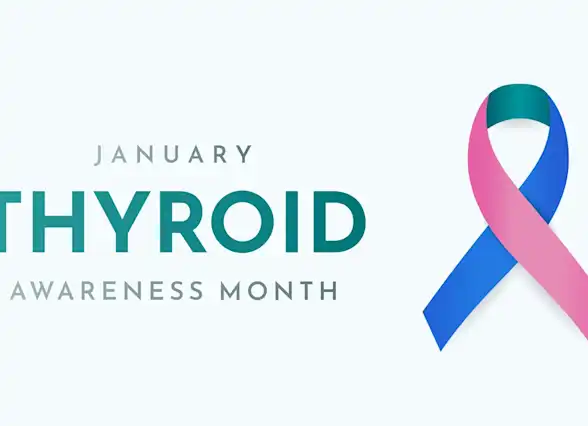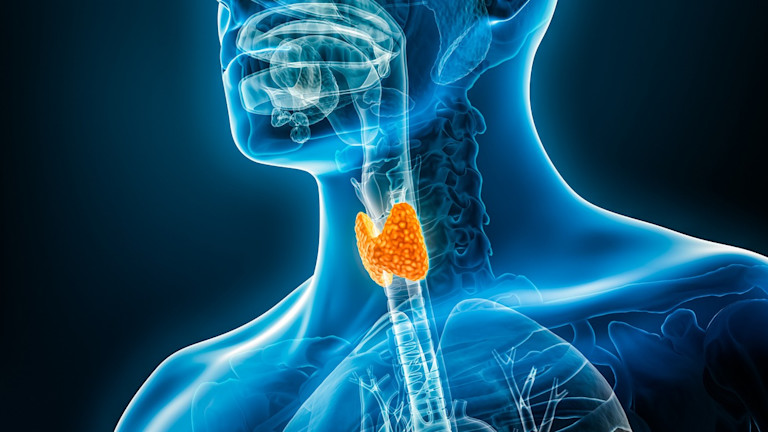Thyroid Dysfunction is Prevalent in Older Adults
Thyroid disorders have no age limits and the incidence of thyroid problems steadily increases with age.
Get insurance benefits, legal documents, and medical records in one place

Helpful Highlights
Studies show that thyroid illness is very much a disease of the elderly and it often goes undiagnosed.
Thyroid disorder is sometimes difficult to diagnose in older adults, as symptoms are not always as widespread or obvious as those in younger people.
Many changes in thyroid function have been described in the elderly and are attributed to age-related physiological changes in thyroid function, coexisting illnesses, and polypharmacy (regularly taking five or more medications).
Thyroid dysfunction may be associated with significant morbidity if misdiagnosed and left untreated.

What is the thyroid?
The thyroid is a butterfly-shaped gland located in the neck, just below the Adam's apple. It plays a crucial role in regulating the body's metabolism by producing hormones that influence energy production, growth, and the functioning of organs and tissues throughout the body. The thyroid is controlled by the hypothalamus which releases thyrotropin-releasing hormone (TRH), which then stimulates the pituitary gland to release thyroid-stimulating hormone (TSH).
The thyroid volume decreases due to progressive fibrosis and atrophy with advancing age.
Why is thyroid health important?
In a sentence - because it is a powerful endocrine gland that affects different functions throughout the body.
When overactive (hyper-) or not active enough (hypo-), it affects your loved one's physical and mental well-being because of its impact on function (mobility and strength) and cognition (mental processing and clarity in thinking).
Low thyroid function (hypothyroidism) is present in up to 5% of older adults and subclinical hypothyroidism is present in up to 15% of people aged 65 and older.
Thyroid disorder diagnosis can be tricky since it often shows up as a disorder of another system in the body, such as the gut, heart, or nervous system. Older persons with thyroid disorders require special attention to gradual and careful treatment, as well as lifelong follow-up.
What can I do for my loved one?
Foremost, ensure that you are regularly checking in with your loved one on how they're feeling and what physical or mental changes they may be experiencing from day to day.
Also ensure that any new or worsening symptoms are reported to your loved one's primary care provider, even if they are subtle or your loved one doesn't seem worried about them.
Encourage your loved one to attend all healthcare-related appointments and engage in any testing, scheduled follow-ups, or additional recommendations, no matter who the appointment is with - their primary care provider, dentist, cardiologist, home health nurse, physical therapist, VA liaison... Whomever.
If your loved one has already been diagnosed with thyroid disease, ensure that they are referred to an endocrinologist and faithfully follow their treatment regimen.
Symptoms of thyroid disease
Symptoms of thyroid disease in those aged 60 and over are often nonspecific and present as weakness, falls, and confusion or other cognitive impairments. Other indicators might include:
"Fluttering" heart and vague chest discomfort with moderate activity
Constipation
Falling asleep frequently
Loss of strength in legs
Joint or muscle pain
Excess weight loss despite a good appetite
Unexplained weight gain
Difficulty swallowing, dry cough, hoarseness
Dry, itchy skin
Eye problems, including changes in vision, sensation, or physical appearance
Hearing loss
Hand tremors
Persistent and significant depressive symptoms
Thyroid abnormalities may also be detected with routine testing (i.e., annual wellness visits and blood tests).
Another important indicator of thyroid disease in an older adult is a history of thyroid disease in a close family member (sibling or child).
Treatment
Specific treatment depends on the thyroid disorder, though typically consists of oral medications and monitoring, and sometimes involves iodine therapy or surgery.
The approach to the management of thyroid disorders in the elderly differs from that for younger individuals in that it considers frailty, coexisting medical illness and medications, clearance rate of medications, and drug-drug interactions along with target organ sensitivity to the treatment.
RESOURCES
Dedon, J. (2022). Thyroid disease in aging. Missouri Medicine, 119(4), 351.353. Link
Papaleontiou, M., & Heymart, M.R. (2012). Approach to treatment of thyroid disorders in the elderly. Medical Clinics of North America, 96(2), 297-310. DOI
Thiruvengadam, S., & Luthra, P. (2021). Thyroid disorders in elderly: A comprehensive review. Disease-a-Month, 67(11). DOI
No content in this app, regardless of date, should ever be used as a substitute for direct medical advice from your doctor or other qualified clinician.
Get more support and guidance on insurance benefits, medical records and legal forms.
Helpful brings together your insurance benefits, legal documents, and medical records in one personalized place — so you always know what you have, and never have to search again.

Technology for Health Tasks. Mental Health for the Tough Stuff.
Helpful connects your medical records, insurance, and caregiving tasks automatically. And when you need more than logistics, a therapist is here to guide you.
In-Network and Covered
For Individuals, Couples and Families
HIPAA Compliant, Data Stays Private


Healthcare Tasks Simplified

From syncing records to spotting drug interactions, Helpful does the heavy lifting, turning complex health info into clear tasks and showing you benefits you can actually use, giving you clarity and control over your care.

In-Network Mental Health

Our licensed therapists are here to support you and your loved ones through stress, burnout, and life’s hardest moments, with an inclusive, compassionate approach that works with most insurance plans.

Create Legal Documents

Plan ahead by creating will, trusts, advance directives and more, that ensure your wishes are honored in the event you can’t speak for yourself -with Helpful guiding you every step of the way.